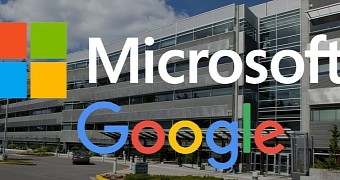Google isn’t really the biggest supporter of modern Windows, and Windows Phone users certainly know this best. The search company has refused to launch apps for Microsoft’s smartphone platform and is now staying away from the universal app push for Windows 10 as well.
And yet, Google now has a plan to become what it calls “a great Windows platform,” but the whole thing is happening with a completely different purpose: to become a bigger player in the cloud.
In other words, Google doesn’t want to create products for Windows, but for Windows customers who want to migrate to its services, thus in the end giving up on Microsoft’s solutions.
The cloud push
Here are a few more details. At the Google Cloud Next conference in San Francisco, the Mountain View-based company made it clear that it was not satisfied with being behind in the cloud race after Microsoft and Amazon and unveiled a series of plans that would help it boost the number of customers.
One of these plans is to create what it calls “a great Windows platform,” and although at first glance it looks like Google loves Windows, it’s not. Google is actually launching a new partner program to migrate Windows companies to its own cloud services.
“Our goal isn’t just to be an OK Windows platform, we want to be a great Windows platform,” Google’s vice president of cloud platforms, Brian Stevens, was quoted as saying.
In order to ensure a migration process that completes as smoothly as possible, Google is adopting a strategy that we’ve seen at Microsoft before, including compatibility for products developed by rivals. There are pre-configured images for a series of Microsoft solutions, including SQL Server Enterprise and Windows Server Core.
Unfortunately, though Google is looking into playing nice with Windows, this doesn’t necessarily mean the company would change its approach regarding Windows 10 and Windows 10 Mobile. There still are no plans for universal apps, as the company sees no reason to develop apps for Microsoft’s modern Windows operating system.

 14 DAY TRIAL //
14 DAY TRIAL //